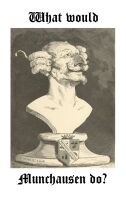|
by Herman Melville  A complex pastoral with anthropological tangents
A complex pastoral with anthropological tangents
In Chapter 17 of this book, the narrator conveys his feelings about the differences between Western civilization and other cultures: "The term 'savage' is, I conceive, often misapplied, and indeed when I consider the vices, cruelties, and enormities of every kind that spring up in the tainted atmosphere of a feverish civilization, I am inclined to think that so far as the relative wickedness of the parties is concerned, four or five Marquesan islanders sent to the United States as missionaries might be quite as useful as an equal number of Americans dispatched to the islands in a similar capacity." This portrayal of primitive cultures as being more civilized than Western society is part of a long tradition, beginning at least with Montaigne's essay "Of Cannibals." This and other similar statements by Melville in this work caused quite a tempest in Europe and the United States, but one which was a gentle breeze, compared to the current storm raging in academia regarding the origins and validity of the terms "civilized" and "primitive." I am myself interested in the statement above for another reason. Some fifty years ago, a small group of inhabitants of the Marquesas Islands, in which this book is set, came across this romance. They had long before adopted Western ways, but these individuals decided to use Melville's work as a means to recreate the pastoral moment which the author had captured in this book. Such an effort was as feasible as would be an attempt to recreate the America portrayed in Norman Rockwell's paintings, but these islanders were convinced of the necessity and possibility of this act, and they reconstructed, with admirable accuracy, a past that had never existed. They gave up their new houses, their churches, their Western foods, for a lifestyle closer to that portrayed in this work, a large part of which consists of quasi-anthropological description of rituals, feasts, customs and dress. Naming children after characters in the book became common, though only in those regions in which the Melvilles, as they were called, were predominant, just as there are still a few adults named Rainbow and Sunflower in the U.S., a legacy of the hippie movement. And in keeping with the full spirit of Melville's portrait of the Marquesans, and inspired by the passage I cited above, several families did indeed move to the United States in order to proselytize their lifestyle to the Westerners whose ways these Marquesans had rejected. It is well known that their efforts failed, for the most part, both here and in their home country, but it was a happy accident that my interest in Melville led me to meet Fayaway, one of the descendants of that tribe of emigrants to the United States, and that she and I would soon after wed. As a result, I have become indoctrinated into the remnants of this culture; without either of us being true adherents to the religion, we observe its customs, much as agnostics celebrate Christmas. Our favorite part of the entire set of customs is to replay the Ritual of the Canoe from Chapter 18, as gently erotic now as when it was written, first in Hobomok Lake in Phoenicia, New York, and more recently in Malibu Lake, California. The puritanical fussbudgets in both neighborhoods were appropriately scandalized. As a result of my marriage to the living incarnation of the female protagonist of the romance, I am well familiar with this work, and must say that it is more nearly perfect, in its own way, than is Melville's masterpiece Moby Dick. It embodies many of the same themes as that larger work, and reveals, because of its imperfections, a deep glimpse into the author's mind and his longing for that tropical paradise where he sought Arcadia and found a nymph fit to his fancy. Rarely have adolescent male fantasies been given such a beautifully complex form, and if, as many have noted, the anthropological tangents detract from the narrative, it is helpful to recall that Melville was attempting create a fiction that looked like an authentic travel narrative, and that in any case those tangents can become of themselves interesting diversions, and commentary on the greater narrative. They even inspired a small group of South Pacific Islanders to fly from their homes and settle in the wilderness of the United States, in an effort to save us from our wicked ways. |

